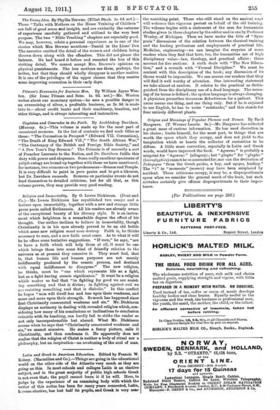Latin and Greek in American Education. Edited by Francis W.
Kelsey. (Macmillan and Co.).—Things are going in the educational world on the other sido of the Atlantic very much as they are going on this. In most schools and colleges Latin is an elective subject, and in the great majority of public high schools Greek is not even that; the pupil cannot learn it if he will. Here, to judge by the experience of an examining body with which the writer of this notice has been for many years connected, Latin, b :come elective, has lost half its pupils, and Greek is very near
the vanishing point. Those who still stand on the ancient ways will welcome this vigorous protest on behalf of the old training. The volume begins with a statement of the case for humanistic studies given in three chapters by the editor and in one by Professor Wenley, of Michigan. Then we have under the title of " Sym- posia" discussions of the relation between the classical training and the leading professions and employments of practical life. Medicine, engineering—we can imagine the surprise of some readers when they find that here, too, the humanities are of high disciplinary value—law, theology, and practical affairs : these account for five sections. A sixth deals with "The New Educa- tion," and a seventh with "Formal Discipline." We must be content with this description of the book; any discussion of its theme would be impossible. We can assure our readers that they will find it well worthy of attention. One interesting statement we take almost at random. It relates to the practical as distin- guished from the disciplinary use of a dead language. The mean- ing of its terms is defined ; the spoken language is always changing. A physician prescribes Geranium Robertianutn for a patient. This name means one thing, and one thing only. But if he is enjoined to use English, he has to write " redshanke," and this stands for four entirely different plants.


































 Previous page
Previous page